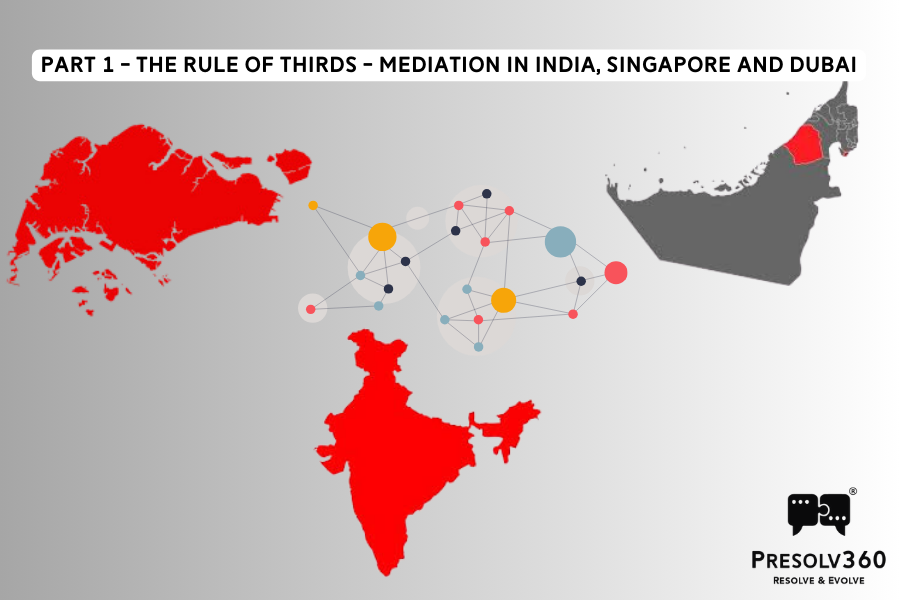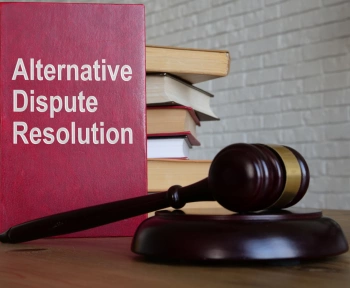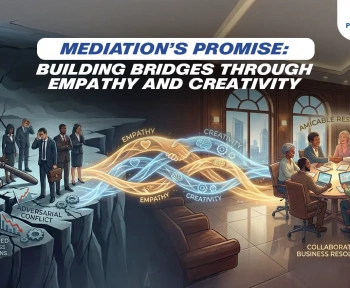PART 1 – Mediation through the prism of ODR in India, Singapore and Dubai:
India, a melting pot of the ancient and the modern; Singapore, a city-state, prominent for its modernity and innovation; Dubai, an emirate in the United Arab Emirates, known for its ultramodern architecture; – what connects the three?
India, Singapore, and Dubai, share striking similarities amidst their diverse landscapes. With a rich tapestry of cultures, woven together by centuries of trade and interaction, they have emerged as economic powerhouses, drawing businesses and investments from across the globe. Rapid urbanisation has transformed their skylines, but it has not stopped the spirit of the countries from being kept alive by the culture, the history and most importantly, the people. As significant economic centres in their respective regions, they serve as vital hubs for trade, finance, and commerce.
There is, however, another factor which unites the three regions – the practice of Mediation and the advent of Online Dispute Resolution (ODR).
Mediation in India dates back to ancient times, with Panchayats resolving community disputes through an impartial mediator known as the ‘Panch Parmeshwar’. In Singapore, mediation has roots in Asian cultures, with elders serving as an intermediary between disputing parties. Similarly, in the Middle East, Mediation is rooted in Arabic/Islamic traditions. It is exemplified by Prophet Muhammad’s role in resolving disputes, such as the reconstruction of the Ka’ba (considered Islam’s holiest site).
The historical evolution of mediation across India, Singapore, and the Middle East is a testament to its significance in diverse cultural contexts.
In this trilogy, we are all set to delve into learning about Mediation in three major hubs – India, Singapore, and Dubai. In this three-part exploration of Mediation, we will analyze three aspects – ODR, culture, and the prevailing legal framework. Join us as we unravel the threads of mediation and discover the intricacies of this discourse.
It could be considered somewhat inaccurate to say that ODR is the future of conflict resolution. That is because ODR has well and truly arrived; it is the present. ODR has emerged as a cornerstone of modern conflict resolution and has made it possible for digital platforms to streamline and expedite the settlement (and disposal) of disputes. As internet use expands and reliance on digital channels increases to a large extent, ODR has become the present-day solution for resolving conflicts seamlessly and within a reasonable timeframe.
India, recognizing the transformative potential of ODR, has taken the concept in its stride with ease. ODR offers not only accessibility, convenience, and flexibility, but it allows parties to engage in resolution processes from the comfort of their own homes. It transcends geographical barriers and minimizes the need for the physical presence of parties in courtrooms. ODR platforms rely on advanced technologies to facilitate communication and document management, thereby ensuring efficiency and accuracy in the dispute resolution process. Moreover, the integration of technology into legal processes through ODR not only expedites the resolution process but also promotes transparency and fairness, while cultivating trust in our justice system.
All Eyes On…
Along with India, Singapore and Dubai have emerged as global hubs of mediation and arbitration and have effectively carved out a space for ODR on a global level. Both regions foster environments that are conducive to the resolution of international disputes. They have strategically positioned themselves as premier destinations for businesses seeking efficient and reliable mechanisms for resolving conflicts.
India:
The growth of ODR in India was driven by the requirement for efficient dispute resolution mechanisms. India’s ODR landscape today witnesses an innovative curve with new and upcoming advancements in digital infrastructure and with many government-backed initiatives for ODR and Mediation. In India, despite the establishment of various mediation centres/institutions, private mediation has a history of lacking formal structure and legal standing. The Mediation Bill 2021, was the Indian government’s answer to this. It aimed at refining mediation practice and establishing a coherent legal framework. It sought to foster greater confidence in the people of India and to present Mediation as a viable option to resolve disputes.
On 15 September 2023, the Mediation Bill received presidential assent, formally enacting it as the “Mediation Act 2023.” It offers individuals as well as businesses a structured and legally recognized alternative to litigation.
The Mediation Act consolidates various forms of mediation, including pre-litigation, online, and community mediation, under a unified legal framework. In line with international practices and the Singapore Convention, it abolishes the distinction between mediation and conciliation. It specifically states that it is an act to make online mediation an acceptable and cost effective process. The act has been successful in acknowledging Online Mediation as one of the default routes to dispute resolution, with Chapter VII entirely spotlighting the concept of Online Meditation. It also throws light on Mediation Service Providers in Chapter XI – A “mediation service provider” under the Mediation Act 2023 includes organisations recognized by the Mediation Council of India such as legal authorities or court-annexed mediation centres. These providers are responsible for facilitating mediation services, accrediting mediators, maintaining mediator panels, while ensuring necessary infrastructure and administrative support for effective mediation processes.
The Indian legal system has made efforts to promote mediation as a means to unclog courts and provide faster resolutions. The introduction of the Commercial Courts Act in 2015 mandated pre-litigation mediation for commercial disputes, further promoting its adoption.
Overall, online mediation in India is gaining acceptance and is supported by a legal framework that recognizes its validity and enforces agreements reached through this method. As digital infrastructure continues to improve and awareness grows, online mediation is expected to play an increasingly significant role in resolving disputes effectively across various sectors.
Both ODR and mediation in India benefit from supportive legislative frameworks and increasing digital infrastructure. They offer promising avenues for quicker, cost-effective, and more accessible resolutions, addressing the growing complexity and volume of disputes in the country.
Singapore:
The heavy burden on the Singapore Courts in the 1980s resulted in higher reliance being placed on Alternative Dispute Resolution mechanisms. Singapore today houses a well-established legal infrastructure and a robust regulatory framework that supports alternative dispute resolution (ADR) mechanisms in the city. The establishment of the Singapore International Mediation Centre (SIMC) in 1991 and the Singapore International Arbitration Centre (SIAC) in 1997 was key in institutionalising the city-state’s mediation and arbitration landscape.
Currently Singapore’s mediation landscape is governed by the Mediation Act 2017 and The Mediation Rules 2017. Interestingly, the legislations do not make a mention of ‘Online mediation’ or ‘virtual’ mediation.
Mediations are conducted on a regular basis in the lower courts of Singapore, but it is only at the State Courts level that the Community Justice and Tribunals System (CJTS) enables citizens to file claims online.
This system operates for cases filed at the Small Claims Tribunal (at which stage lawyers are not allowed to represent parties), Employment Claims Tribunal, Community Disputes Resolution Tribunals (CDRT) and Protection from Harassment Court (PHC). The CJTS guides users to file claims, counterclaims, and responses online. This system allows users to schedule court dates as per the convenience of the parties, view case details, developments and also have access to documents uploaded by the opposite party. The CJTS gives parties the option to participate in e-Negotiation or e-Mediation completely online.
The e-Negotiation tool allows up to 5 rounds of discussions. Parties aim to settle the dispute on their own, without the help of lawyers who represent them. E-Mediation service includes an online session with a Court appointed Mediator. If the e-Negotiation or e-Mediation results in a success, i.e., amicable settlement, the parties are not required to go to Court. At this stage an application for a Consent Order has to be filed in Court in order to record the agreed terms by the parties (for e-Negotiation) or by the Mediator (for e-Mediation).
Dubai:
Dubai has emerged as a leading hub for mediation and arbitration in the Middle East region. The Dubai International Financial Centre (DIFC) Courts and the Dubai International Arbitration Centre (DIAC) are prominent institutions that provide a reliable and efficient platform for resolving commercial disputes. Dubai’s strategic location, business-friendly environment, and modern infrastructure make it an attractive destination for businesses seeking dispute resolution services.
Online Mediation provides a voluntary and an easily accessible approach to resolving civil and commercial disputes that arise between parties in a legal relationship. Mediation has been described in Federal Law No. 6 of 2021 of the UAE.
The legal framework governing mediation in the UAE is Federal Decree Law No. 40 of 2023 on Mediation and Conciliation in Civil and Commercial Disputes, which outlines the roles and responsibilities of mediators and parties involved.
The eMediation platform known as Wasata, launched by the Ministry of Justice, offers an online alternative to traditional litigation processes. It connects users with registered mediators proficient in conducting proceedings in Arabic and/or English. Wasata manages mediator registration, renewal, and removal, facilitates mediation sessions and assists in preparing final mediation reports.
This platform aims to expedite dispute resolution and alleviate the burden on court systems. In 2022, the utilisation of ADR methods for civil and commercial disputes in the UAE achieved a settlement rate of 61.3%.
Conclusion:
India, Singapore, and Dubai each represent unique amalgamations of tradition and modernity, drawing global attention as vibrant economic centers. As pivotal hubs for commerce, finance, and innovation, they exemplify the evolution from ancient trade routes to modern economic powerhouses. A significant commonality among these regions lies in their embrace of mediation and the advent of ODR. ODR, propelled by technological advancements, offers efficient and accessible alternatives to traditional litigation, exemplified by platforms like India’s eCourts and Dubai’s Wasata. The legislative frameworks in each region, such as India’s Mediation Act 2023, Singapore’s Mediation Act 2017, and Dubai’s Federal Decree Law No. 40 of 2023, underscore their commitment to enhancing dispute resolution mechanisms.
As we explore mediation in these three dynamic environments, we uncover not only their shared commitment to innovative dispute resolution but also the nuances that define their individual approaches. This exploration promises insights into how these regions navigate contemporary challenges while upholding their distinct cultural legacies.




